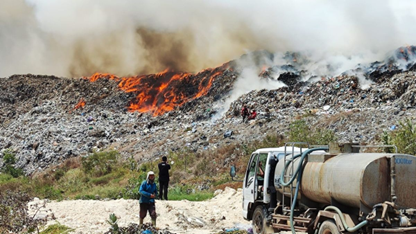Indonesia's Plastic Waste and Landfill Fire Crisis
- Terra Water Indonesia
- Nov 23, 2023
- 3 min read
Indonesia is currently experiencing a major environmental crisis due to the large volume of waste and pollution – particularly plastic waste, and air pollution caused by landfill and peatland fires.
According to WWF, the volume of plastic waste globally has increased by more than 100% from the year 2000 to 2019.

Why is there so much plastic waste?
The large amount of single-use plastic – such as plastic water bottles and gallons – being thrown away, as well as the inefficient waste management system throughout Indonesia are major factors to this crisis. In fact, it has been estimated that Indonesia alone produces 67 million tons of plastic waste per year. This staggering figure puts Indonesia as the fifth largest worldwide contributor of plastic waste.
The vast amount of waste is therefore causing landfills to overfill and waste to make its way into the rivers and oceans.
In August 2023 it was reported that four of Indonesia’s rivers – Brantas, Ciliwung, Citarum, and Progo – are part of the world's 20 most polluted rivers. In addition to rivers, research has shown that 1.29 million tons of waste ends up in the ocean every year. .

Environmental groups such as Pandawara Group and Sungai Watch have uploaded videos to their social media accounts to educate people about the severity of the waste in rivers, on beaches, and in the oceans across Indonesia. As well as informing people of the situation, they acted alongside many volunteers to begin cleaning these areas. These organisations have been hugely successful at spreading the word both online and in person and beginning the clean-up process, but there is still much work to be done.
In addition to waste entering the waterways, landfills across Indonesia are overflowing due to the sheer amount of waste being produced. In Bali alone, the volume of waste is now unavoidable with Bali’s largest landfill (Suwung TPA) being at full capacity and new spaces having to be created using old rice paddies.
To visualise, Bali’s largest landfill site (located between Kuta and Sanur) is the size of 56 football fields and is piled as high as a five-story building. Not only is this extremely large, but since the beginning of October, this site (alongside other, smaller landfill sites) has been on fire.

(PHOTO of Public Relations of Denpasar Police)
With a large proportion of this smouldering waste being non-recyclable and non-biodegradable plastics, the fumes being released into the environment are increasingly hazardous. The smoke alone is reducing the air quality in areas such as Denpasar, Kuta, Seminyak, and Canggu, this has the potential to lead to various respiratory diseases for people living in affected areas. Also, the toxins released from burning plastic can have extremely negative effects on neurodevelopment, endocrine functions, and reproductive functions.
Our environment is also impacted considerably by this burning waste, emitting additional greenhouse gases into our atmosphere and further encouraging the climate change crisis.
Due to the delay in this year’s rainy season, the fire at Suwung TPA continued to smoulder until 19th November - resulting in over 6 weeks of burning.
Plastic waste in Indonesia: what can be done to help?
Firstly, the waste management system in Indonesia is in need of a rethink, as the current system is crumbling due to the extremely high demand by both residents and tourists. Recently, the Acting Governor of Bali met with leaders from local activist groups to discuss a waste strategy to prevent future landfill fires and improve the current waste management system. They now plan to begin enforcing stricter laws with regards to discarding of waste.
As individuals, it is imperative that we reduce the amount of single use plastic we are using. Whether this involves using a refillable water bottle or refraining from using plastic gallons and instead switching to a sustainable water filtration system. These small behaviour changes will make an impact on both our health and the environment.
Although this is a big problem to face, a number of organisations such as Sungai Watch, Pandawara Group, Bye Bye Plastic Bags and Youthtopia, and Terra Water Indonesia have started to tackle it both by raising awareness of the issue and tackling it head-on. For instance, in the last 3 years, Sungai Watch alone has installed 180 barriers in waterways to prevent waste entering the ocean, and held 800 community clean ups resulting in over 1.5 million kg of plastic being collected.
This is a great start to this overwhelming issue but there is still more work to be done. So, let's work together to create a cleaner, and greener Indonesia!
Comments